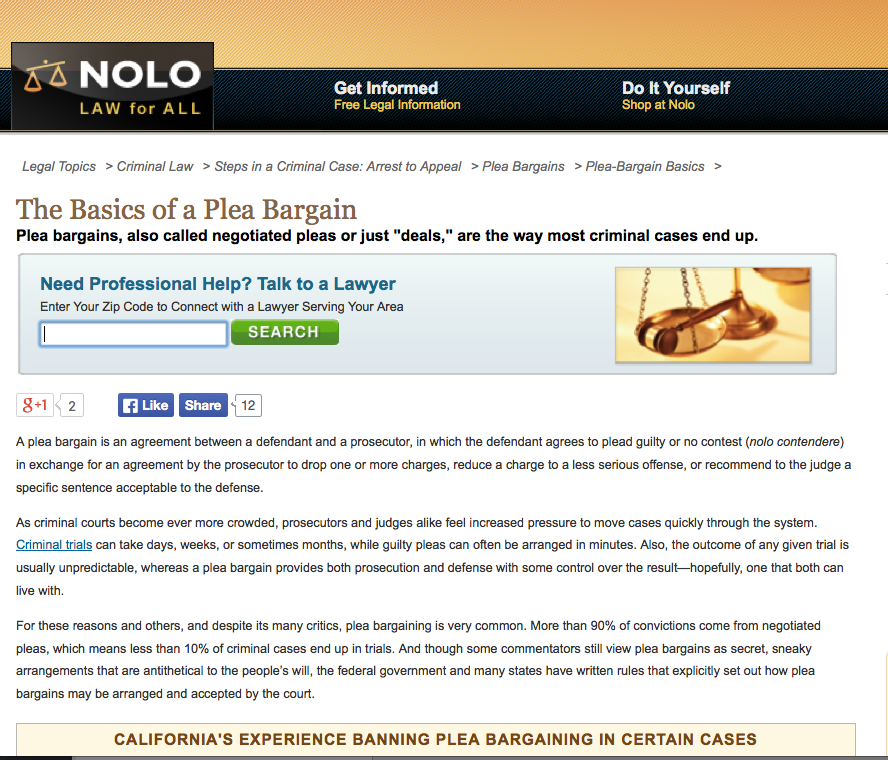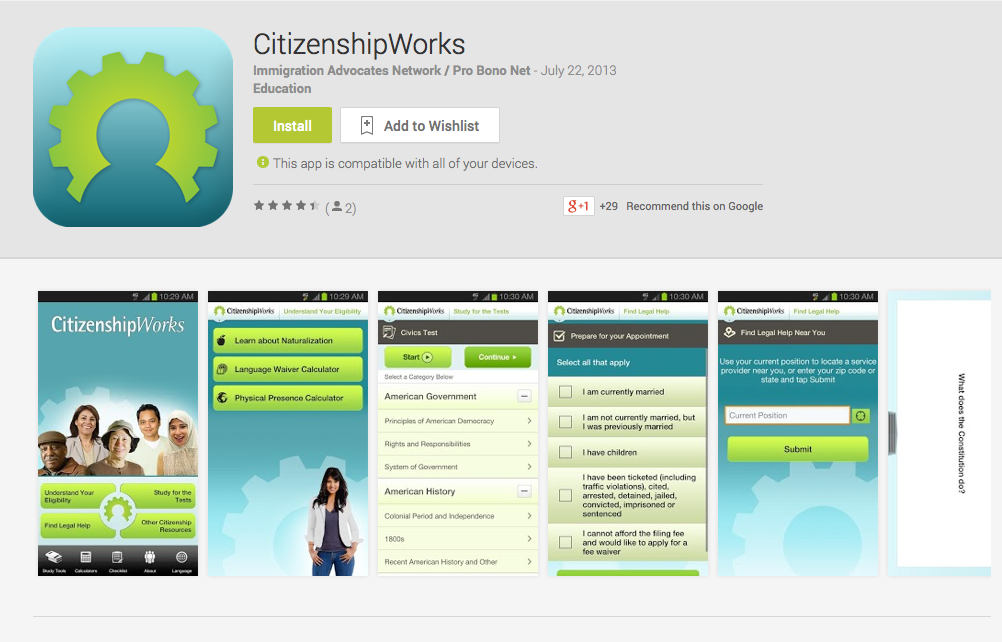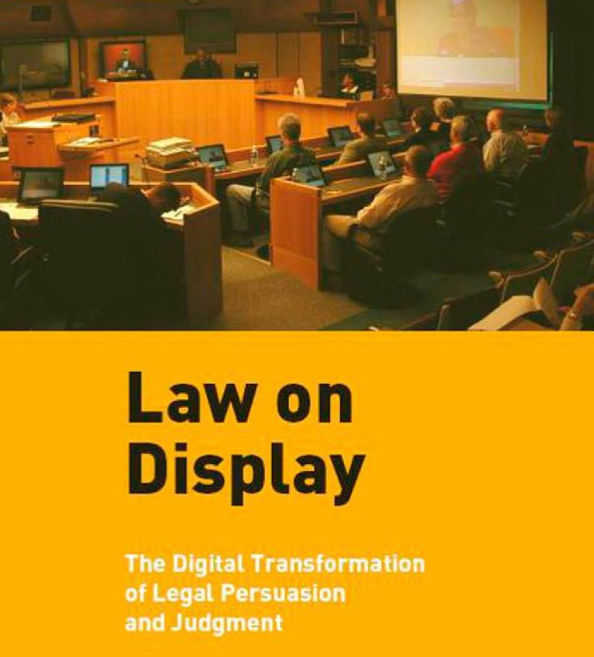via Plea Bargain Basics: Negotiating a Lesser Crime | Nolo.com.
A plea bargain is an agreement between a defendant and a prosecutor, in which the defendant agrees to plead guilty or no contest (nolo contendere) in exchange for an agreement by the prosecutor to drop one or more charges, reduce a charge to a less serious offense, or recommend to the judge a specific sentence acceptable to the defense.
As criminal courts become ever more crowded, prosecutors and judges alike feel increased pressure to move cases quickly through the system. Criminal trials can take days, weeks, or sometimes months, while guilty pleas can often be arranged in minutes. Also, the outcome of any given trial is usually unpredictable, whereas a plea bargain provides both prosecution and defense with some control over the result—hopefully, one that both can live with.
For these reasons and others, and despite its many critics, plea bargaining is very common. More than 90% of convictions come from negotiated pleas, which means less than 10% of criminal cases end up in trials. And though some commentators still view plea bargains as secret, sneaky arrangements that are antithetical to the people’s will, the federal government and many states have written rules that explicitly set out how plea bargains may be arranged and accepted by the court.
California’s Experience Banning Plea Bargaining in Certain Cases
In 1982, California voters passed Proposition 8. It banned plea bargaining when the “information” (the document that formally charges a defendant with a crime, issued after a preliminary hearing) or the indictment (the charging document issued by a grand jury) charges a serious felony, certain violent sex crimes, any felony in which the defendant used a gun, or any offense of driving while under the influence. (Ca. Penal Code Section 1192.7.) The law had only three exceptions–bargaining could be done when
there is insufficient evidence to prove the people’s case
testimony of a material witness cannot be obtained, or
a reduction or dismissal would not result in a substantial change in sentence.
But cases continued to be negotiated and pled, even when the exceptions didn’t apply–how so? The law applies only to charges in the information or indictment, which meant that it did not prohibit bargaining prior to that, such as after arraignment, or before the preliminary hearing, or during a grand jury investigation. Prosecutors and defense attorneys do their negotiating during these times. Often, the bargain suffers as a result of both sides not having enough information to make informed offers and acceptances. And sometimes, evidence that comes to light after the case is bound over for trial might motivate either side to seek a negotiated plea–but it’s too late. Critics of the plea bargain ban, seeing it as the public’s emotional response to crime, have pressed for its repeal.
Charge Bargaining and Sentence Bargaining
Plea bargaining can be divided into two types: sentence bargaining and charge bargaining. Sentence bargaining is a method of plea bargaining in which the prosecutor agrees to recommend a lighter sentence for specific charges if the defendant pleads guilty or no contest to them. Charge bargaining is a method where prosecutors agree to drop some charges or reduce a charge to a less serious offense in exchange for a plea by the defendant.
To learn more about what happens in court when the plea is made, see Pleading Guilty in Court.
When Are Plea Bargains Negotiated and Made?
In most jurisdictions and courthouses, plea bargaining can take place at virtually any stage in the criminal justice process (but see the California exception, explained above). Plea deals can be struck shortly after a defendant is arrested and before the prosecutor files criminal charges. Plea negotiations may culminate in a deal as a jury returns to a courtroom to announce its verdict. If a trial results in a hung jury, in which the jurors are split and cannot make the unanimous decision required, the prosecution and defense can (and frequently do) negotiate a plea rather than go through another trial. And plea deals are sometimes reached after a defendant is convicted while a case is on appeal.
Pleading “No Contest” (nolo contendere) In Place of a Guilty Plea
A no contest or nolo contendere plea in essence says to the court, “I don’t choose to contest the charges against me.” This type of plea, often part of a plea bargain, results in a criminal conviction just like a guilty plea. And a no contest plea will show up on a criminal record. However, if the victim later sues the defendant in civil court, the no contest plea cannot be offered into evidence against the defendant as an admission of guilt. A guilty plea, on the other hand, does serve as an admission of guilt and can be introduced in civil cases as evidence against the defendant.
No contest pleas are useful when the defendant can expect a civil lawsuit from victims, as well as criminal prosecution. For example, a driver who kills someone while allegedly driving recklessly might face vehicular manslaughter charges, and could expect to be sued by the victim’s family. If the driver pleads guilty, his admission of guilt (that he drove recklessly) means that the plaintiffs need not produce any evidence of his driving. If he pleads no contest, the plaintiffs will have to prove that he drove recklessly in order to prevail.
The Consequences for Your Criminal Record
A guilty or no contest plea entered as a judge-approved plea bargain results in a criminal conviction; the defendant’s guilt is established just as it would be after a trial. The conviction will show up on the defendant’s criminal record (rap sheet). And, the defendant loses any rights or privileges, such as the right to vote, that the defendant would lose if convicted after trial. Depending on the nature of the conviction and the defendant’s other interactions with the law, however, the defendant might be able to seal, or expunge, the criminal record.
For information on sealing or expunging a criminal record, see Expungement & Sealing Adult Criminal Records.


